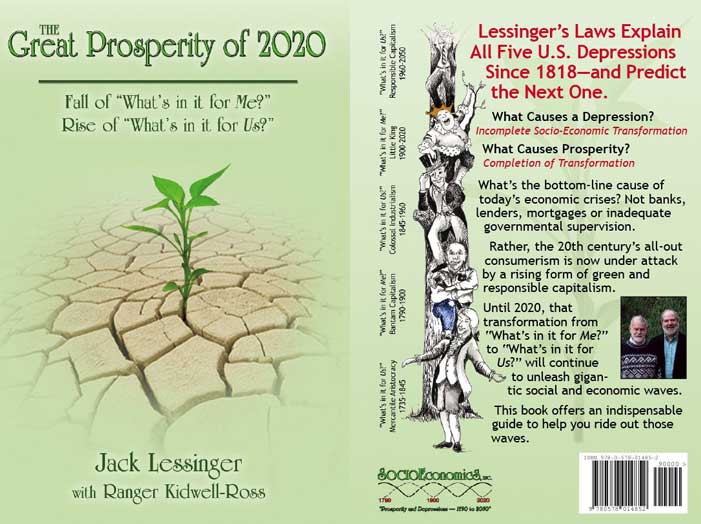The Great Prosperity of 2020

The Great Prosperity of 2020:
Fall of “What’s in it for Me?”
Rise of “What’s in it for Us?”
by Jack Lessinger, Ph.D and Ranger Kidwell-Ross
Published by SocioEconomics, Inc.
View the Socio-Economic Timeline
Our ‘Little King’ consumer-based economy has run its course.
The 20th century ignited an accelerating consumer binge we can no longer sustain. Our mania for over-consumption now shackles us to a litany of economic problems: consumer debts, federal deficits, trade imbalances, inequality of income and wealth, runaway speculation in real estate and stocks, insecure social security, plunging business ethics and environmental degradation. Our pursuit of immediate gratification plays a role in rampant obesity and uncontrollable medical costs. And, as we burn oceans of oil and mountains of coal, global warming imperils the planet.
In the 21st century, the consumers’ former rallying call of “What’s in it for Me?” is increasingly overshadowed by “What’s in it for Us?” Unbridled materialism is slowly yielding to the satisfactions of defending the community–assuring full employment, preventing global warming, protecting the environment. A new society and economy is emerging. Call it Responsible Capitalism. When ‘We the People’ seek redemption from our mania for excess, we search for new meaning and direction. A transformation changes our society and economy.
After 1790, the first transformation in U.S. history (from “What’s in it for Us?” to “What’s in it for Me?”) sent dirt-poor farmers to nearly free land in the Mississippi Basin. The paradigm was clear. Take care of Number One. Get your very own piece of valley land–no matter how small. Stay out of big cities. Prize your independence.
After 1845, the second transformation (from ‘Me’ to ‘Us’) introduced a new vision. In a world mad with nationalistic ambitions, Americans sought to make the nation the foremost industrial power. Us power. Millions migrated to rapidly growing cities surrounding Chicago.
After 1900, and especially after World War II, the third transformation (from ‘Us’ to ‘Me’) opposed further industrialization and launched the Little King consumer economy. Each of us became the little king of our own domain. The new paradigm reprogrammed attitudes away from saving to free-spending, from waiting and sacrificing to consuming. “We want it all and we want it NOW.”
Our elders well remember the sexy young women, smiling from the billboards, urging strait-laced and penurious citizens to save less and spend more. Advertisements screamed “buy, Buy, BUY!” Buy Coca Cola and be happy. Buy Dentine gum and be kissable. Buy Camels and be manly. The Little King consumer economy blossomed. Houses grew bigger and more lavish; cars became roomier, faster, more comfortable. What a great time to be alive.
Emerging since the 1960s, the fourth transformation is turning us away from what have become unsustainable and, ultimately, non-happiness producing consumer appetites toward concern for the community–another paradigm shift, this time from “What’s in it for Me?” to “What’s in it for Us?”
A great divide separates 2009 from the values and beliefs of only a few years earlier. In 2004, a Gallup Poll editor reported that the public is “practically dozing” on global warming (April 20, 2007, Lydia Saad). Three years later, in 2007, polls showed that 88% of Americans believed that global warming threatened future generations and 75% recommended taking immediate action to help the environment. (TIME magazine/ABC News/Stanford University, June 2007.)
The facts didn’t change. We did.
Now, in the latest book from Jack Lessinger and Ranger Kidwell-Ross, you can learn how this latest chapter in the American socio-economy is unfolding. After reading this book, which is written in understandable language, you’ll be among those who know why. You will also have the foundation needed to design an effective future strategy for yourself, your family and your business.
In 2009, the predictions made in Emeritus Professor Jack Lessinger’s prior books have become reality. From the crash of Japan’s economy in the 1990s to the current stock market meltdown and downward spiral of home prices, all were predicted by Jack Lessinger’s ground-breaking understanding of socio-economic interaction.
Drawing on U.S. Census and other data from 1790 to the present, Lessinger’s Laws of Socio-Economics detail specific 20-30 year ‘seasons’ of prosperity and depression. All five United States depressions since 1818 have occurred during the time periods they predict for them to occur.
The unsustainable, consumption-oriented Little King socio-economy is almost—but not quite—behind us. Replacing it will be an environmentally-conscious and caring form of Responsible Capitalism that ‘We the People’ are currently in the process of inventing. This book underscores the sweeping magnitude of the changes that are now in process. Armed with this knowledge, you will better understand the actions needed to ensure a return to prosperity sooner rather than later.
Given the emergent wild card of global warming, we have no time to waste.


